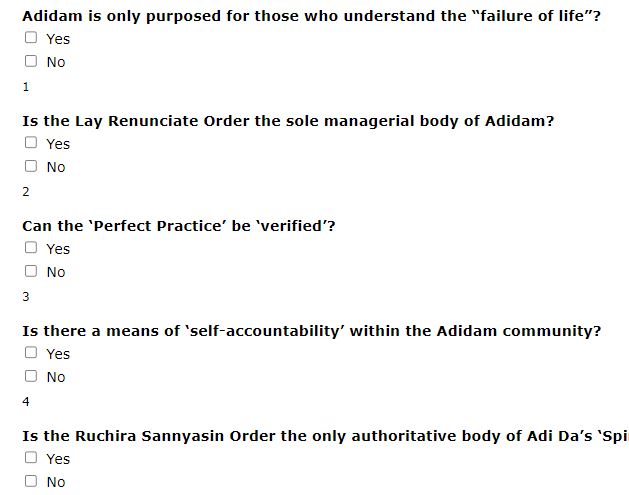Preliminary Report on Adidam Survey
June 10, 2024


Preface
This preliminary evaluation does not aim to validate the answers to the survey questions. Instead, the survey is designed to assess the reliability of the responses and propose conclusions regarding Adidam’s viability as an authentic and influential spiritual path in today’s world.
The Beezone survey on Adidam and its related activities included questions divided into three general areas. The first and most numerous set focused on the organization of Adidam, the governing and authoritative body that preserves the treasures, legacy, and authority of Adi Da Samraj in perpetuity. The next group of questions concerned the understanding of specific teachings of Adi Da, while the third and smallest group focused on the practice and discipline of those teachings.
The organizational questions centered on the authority of Adidam and its hierarchical structure. They also addressed the managerial framework, accountability measures, and the effectiveness of communication with the larger membership body. Additionally, the survey explored the organization’s ability to resolve conflicts within its social, managerial, political, and cultural bodies. Another focus of the questions was the verifiability and accountability in Adidam’s body politic, specifically in its application of levels of practice and the cooperative nature of its organization.
A larger underlying, unwritten question pertained to Adidam’s impact both internally and externally in its integration with the larger community, both locally and globally. This was analyzed through the pattern of answers provided by respondents. By addressing this unasked question, the survey aimed to reveal hidden beliefs and assumptions respondents have about Adidam’s present influence and future viability.
The survey also sought to understand respondents’ views on Adidam’s method of God-realization, guru devotion, and the feasibility of codifying, organizing, governing, and verifying the realization of God both individually and collectively.
Preliminary Findings
As mentioned in the preface, the majority of the questions pertained to the organizational structures, leadership, and accountability within Adidam. Respondents were not identified as members or non-members, but it should be noted that 80% of the initial mailings were sent to current members of Adidam and 20% to those closely associated with it.
The preliminary findings indicate overwhelmingly that the Ruchira Sannyasin Order (RSO) is held in the highest esteem within Adidam. The RSO holds a trust position within the organization and represents the most direct agents or agency of Adi Da’s person and transmission. It was also found that the RSO is a spiritually designated position, not a managerial one. However, there was divided understanding regarding the level of practice required for an RSO member. Half of the respondents believed that for a person to qualify for membership in the RSO their level of practice did not have to be at the level of ‘the Perfect Practice.’
From the survey responses, it is clear that an overwhelming number of respondents believe that the Lay Renunciate Order holds functional capability within the Adidam organization under the spiritual guidance of the RSO.
The survey also addressed the verifiability of practice and whether only official members are qualified to practice the Way of Adi Da (The Way of the Heart). Overwhelmingly, respondents believe that a person’s level of practice can be verified and that the practice of the Five Issues can be confirmed with or without formal membership. However, how this verification occurs was not addressed in the survey. The overall survey questions that had to do with verifiability yielded that those who are not genuinely practicing at specific levels could be identified and their falsehood known.
The final set of questions pertained to the teachings and understanding of Adidam. These questions were the most objective, as their accuracy can be referenced in the literature. It should be noted that direct yes or no answers are often unsuitable for questions about the teachings. For example, questions like “Is Adi Da God?” or “Is Adi Da an agent of God?” are subjective and open to interpretation. However, the question “Is Adidam intended for those who understand the failure of life?” directly relates to an earlier and less recognized teaching of Adi Da, emphasizing the Lesson of Life, and can be answered with a yes or no. Most respondents answered “no” to this question, whereas the correct answer, based on Adi Da’s emphasis and criticism of the search and seeking, is “yes.”
The survey indicates that respondents have a limited understanding of some basic issues surrounding the teachings of Adi Da. One issue is whether faith is a prerequisite for understanding the answers or if discernment based on the study of the teachings is necessary. The preliminary evaluation of the eight questions directly related to the teachings shows that respondents have a mixed understanding of these matters, with clear comprehension notably absent or conflicted in many instances.
Conclusion
This preliminary evaluation of the Beezone survey on Adidam provides critical insights into the organization’s structure, teachings, and practices. The survey aimed to assess the reliability of responses and explore Adidam’s viability as an authentic and influential spiritual path in today’s world.
The findings indicate that the organizational structure of Adidam, particularly the Ruchira Sannyasin Order (RSO), is highly regarded. The RSO holds a trust position representing Adi Da’s transmission, though ii should be spiritually rather than managerially focused. There is some confusion among respondents regarding the practice level required for RSO membership, with half believing it does not necessitate ‘the Perfect Practice.’
Respondents largely believe that the Lay Renunciate Order functions effectively under the spiritual guidance of the RSO. Additionally, there is a consensus that a person’s practice level can be verified, and that the practice of the Five Issues can be confirmed regardless of formal membership. However, the specific methods of verification were not addressed in the survey.
Regarding the teachings of Adidam, the survey revealed mixed understanding among respondents. Objective questions related to the teachings could be referenced in the literature for accuracy, but subjective questions, such as the nature of Adi Da’s divinity, were open to interpretation. The question about Adidam’s relevance to those who understand the failure of life highlighted a significant teaching of Adi Da, yet many respondents answered incorrectly, suggesting a gap in understanding.
Overall, the survey reflects a limited comprehension of some basic issues surrounding Adidam’s teachings. Whether faith or discernment through study is necessary for understanding these teachings remains a point of ambiguity. This preliminary evaluation highlights the need for clearer communication and education within the Adidam community to ensure a more consistent understanding of its principles and practices.

Ed Reither
Beezone
June 10, 2024

Editorial Comment
Nothing new came from this survey; it was only a confirmation of ‘the old.’ What is of interest is given the ‘facts,’ and the clear comprehension that Adidam is a ‘mixed bag’ of mummers, good-hearted and all, The inevitability that Adidam will remain, and with real possibility shrink onto a ‘dot’ on a map in the middle of the Pacific Ocean no one is screaming from the mountain tops! If the ‘assessment’ is obvious, why are there no ‘Paines’ (Thomas, that is) in the House speaking up? This is more to the point than the ‘sleepers’ mumming a tune.
Devotee response: Look at the world itself. Being led into a catastrophic destiny by a handful of individuals controlling and exploiting all. Why is the overwhelming majority of humanity going along with it, like lemmings to the sea? Complacency, indifference, fear, unconscious repetition, and on and on. Add to the mix the average age of a devotee now…70? Older?
KANYA SUPRITHI: Sri Gurudev, there is a growing intuition in me of Who You Are and the Work that You have done and the Work that You are doing. Through this “consideration” of Vivekananda and Your Incarnation here, it is becoming obvious to me that Your Work is not so much a matter of the many people that You might contact, just as it was not for Vivekananda. He did not meet everybody and He did not go to every country, and You do not need to go about meeting people. Rather, it is a matter of this Kiss, this ultimate Kiss that is Given. The Work that You have Done by being here is the most significant Work that can be spoken of. The fact that You have established the Way of the Heart for everyone for all time, and the fact that You are here, those are the greatest Accomplishments that could be.
It seems more and more clear to me, in this statement that You have made at times, “Pay Me now or pay Me later,” that it is inevitable that everyone who incarnates at any time will eventually come to this point where they must do this practice. It is going to come around—this lifetime, or next lifetime.
HEART CONVERSION TALK SERIES, Volume 1, Number 5, “I Am Complete” – 1993